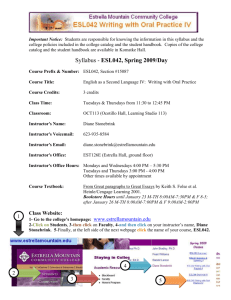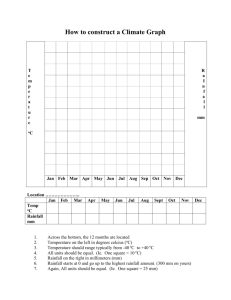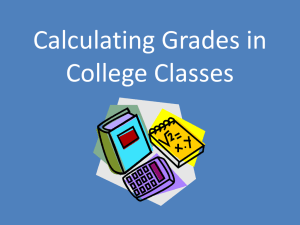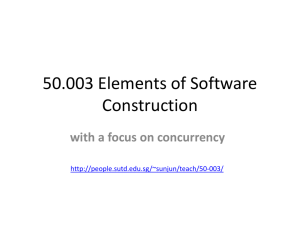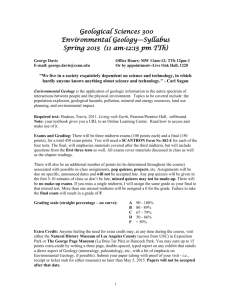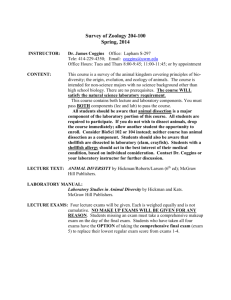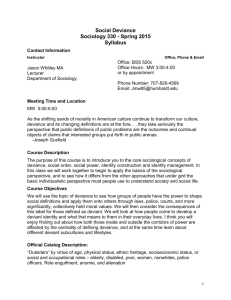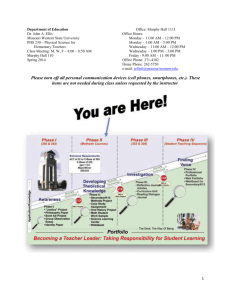THR 225W: TOPICS IN THEATRE & COMMUNICATION
advertisement
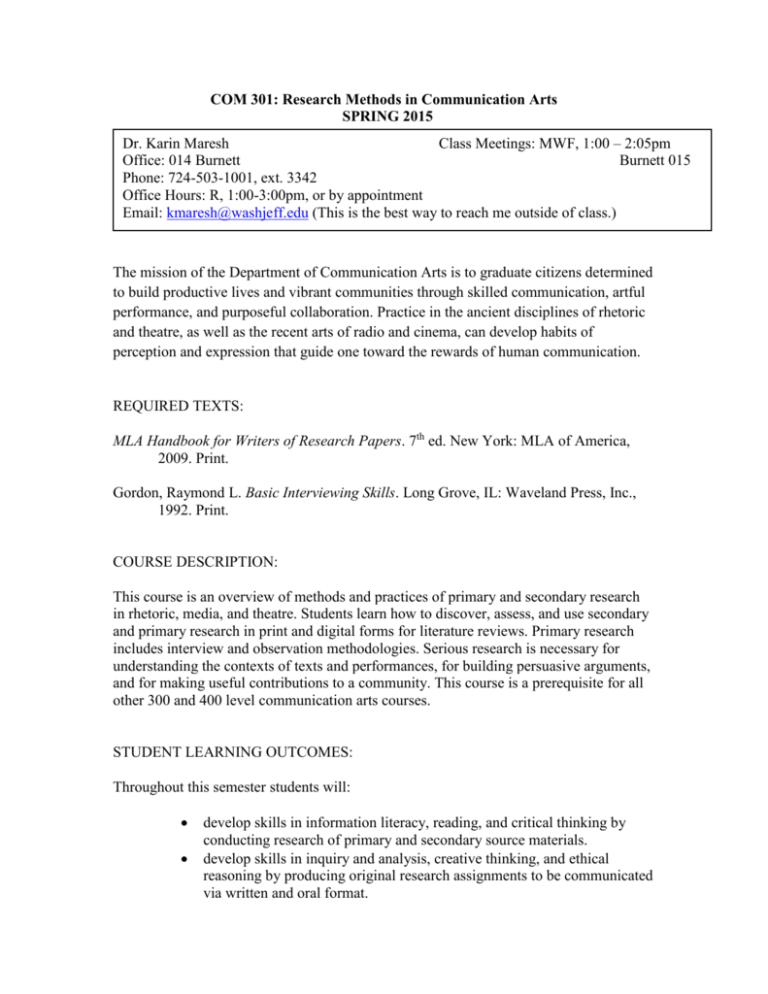
COM 301: Research Methods in Communication Arts SPRING 2015 Dr. Karin Maresh Class Meetings: MWF, 1:00 – 2:05pm Office: 014 Burnett Burnett 015 Phone: 724-503-1001, ext. 3342 Office Hours: R, 1:00-3:00pm, or by appointment Email: kmaresh@washjeff.edu (This is the best way to reach me outside of class.) The mission of the Department of Communication Arts is to graduate citizens determined to build productive lives and vibrant communities through skilled communication, artful performance, and purposeful collaboration. Practice in the ancient disciplines of rhetoric and theatre, as well as the recent arts of radio and cinema, can develop habits of perception and expression that guide one toward the rewards of human communication. REQUIRED TEXTS: MLA Handbook for Writers of Research Papers. 7th ed. New York: MLA of America, 2009. Print. Gordon, Raymond L. Basic Interviewing Skills. Long Grove, IL: Waveland Press, Inc., 1992. Print. COURSE DESCRIPTION: This course is an overview of methods and practices of primary and secondary research in rhetoric, media, and theatre. Students learn how to discover, assess, and use secondary and primary research in print and digital forms for literature reviews. Primary research includes interview and observation methodologies. Serious research is necessary for understanding the contexts of texts and performances, for building persuasive arguments, and for making useful contributions to a community. This course is a prerequisite for all other 300 and 400 level communication arts courses. STUDENT LEARNING OUTCOMES: Throughout this semester students will: develop skills in information literacy, reading, and critical thinking by conducting research of primary and secondary source materials. develop skills in inquiry and analysis, creative thinking, and ethical reasoning by producing original research assignments to be communicated via written and oral format. develop skills in written communication, information literacy, and ethical reasoning by collating research into a concise document and citing sources. CLASS POLICIES: 1. No make-up assignments, quizzes, or exams are allowed without documentation of an illness or emergency. 2. Papers and assignments are to be turned into me at the beginning of class on the scheduled due date. I will only accept hard copies (not via email). Late papers will be penalized by one letter grade for each day (not class period) after the deadline. Papers which are five or more days late will be given an automatic zero. ASSIGNMENTS: 1. Scavenger Hunt – Students will be given a list of questions for which they will need to consult library sources to find the answers. Citations of the sources used must be included along with the answers. 2. Grammar quiz – This quiz will test the student’s knowledge of grammar. 3. Annotated Bibliography – Students will choose a topic (perhaps connected to their final paper) and create a bibliography of at least 20 sources related to said topic. Succinct analyses of each source should be included with each entry, and the sources should also be divided into categories (primary, secondary, etc.). 4. Interview Assignments – Students will conduct two separate interviews, the first of a fellow classmate and the second of someone outside the class. The goal of this assignment is to engage the student in developing a more conscious and deliberate method of interviewing others. 5. Article Summary & Critique – This assignment involves students in an examination of the research and analysis conducted by a scholar in the field. In doing this, students will learn more about how to do research, as well as how to critically read and analyze a work of literature. 6. Resume – Students will work on creating and/or revising their existing resumes via this assignment. 7. Portfolio – Students will work on creating and/or revising their existing portfolios via this assignment. 8. Mock Internship Application – This assignment gives students an opportunity to hone their application writing skills. 9. Proposal for Independent Research Project – This project is meant to prepare students for writing their senior project proposals. Should other projects be assigned throughout the semester, students will be given prior notice. All written assignments for this class MUST be typed (unless otherwise stated), double-spaced, formatted in Times New Roman 12 pt. font, and PROOFREAD. I will take points off for sloppy grammar. **Grades for these assignments will be based primarily upon your level of work in four main areas: research, organization, preparation, and creativity (independent thinking). Work that meets the minimum requirements will earn a “C.” A “B” assignment will show some depth of thought and good use of materials, while an “A” assignment will show significant depth of thought and excellent use of materials. SAKAI: I will use Sakai this semester to post readings, assignments, and links to relevant and useful web sites. If you miss class, be sure to check the Sakai site in the event I issue an assignment in your absence. ATTENDANCE AND PARTICIPATION: You are expected to attend all classes. Each class period is worth two points, one for attendance and one for participation. If you miss a class you lose the points available for that day. Attendance is taken at the start of class and tardiness will be noted and can affect your grade. I count five tardies as an absence. Participation in this class means active involvement in relevant class discussion and group activities. The best piece of advice I can give you is this: In order to critically engage with the material and your classmates, you should take notes and make observations of the course material. Write down all questions that are raised as you read and bring them to class for discussion. This will make the class more interesting for you as well as for the class as a whole. These notes will also be enormously helpful as you study for your midterm and final exams. GRADING: Scavenger Hunt Grammar Quiz Daily Work Interview #1 Interview #2 Annotated Bibliography Article Summary & Critique Resume Mock Internship Application Proposal for Project Attendance/Participation 30 pts. 30 pts. 30 pts. 50 pts. 80 pts. 100 pts. 50 pts. 30 pts. 30 pts. 30 pts. 74 pts. 5% 5% 5% 10% 15% 15% 15% 5% 5% 10% 10% 100% *The total number of available points for the semester may change depending on the amount of daily work that is assigned. GRADING SCALE: A= 93-100 (A), 90-92 (A-) B= 88-89 (B+), 83-87 (B), 80-82 (B-) C= 78-79 (C+), 73-77 (C), 70-72 (C-) D= 68-69 (D+), 63-67 (D), 60-62 (D-) F= 59 and below ACADEMIC RESPONSIBILITY: Academic honesty and integrity is expected of all students. I treat cheating of any sort, electronic or human, very seriously. The written work you hand in or present in class must be your own, no matter how small the assignment, and the sources informing both your ideas and prose should be properly acknowledged. I will avail myself of W&J resources to detect digital plagiarism. If a student is found guilty of plagiarism, he or she will receive a failing grade in the course. If you are confused in any way about this, please see me. Information about W&J regulations concerning plagiarism and academic misconduct can be found online on the College website and in the College Catalog. According to the College’s Academic Honesty Policy, “examples of academic misconduct include, but are not limited to: Plagiarism, which is representing the fruits of another’s intellectual labor as one’s own, whether this is done with the intention to deceive or is the result of incompetence. Examples include using someone else’s ideas, research results, sentence structure, or phrasing without properly crediting the author, thus leading the reader to assume that they are the student’s own creation. Fabricating material and representing it as genuine. This includes falsifying research results for a laboratory report or falsifying information for a written essay. Submitting papers or other academic work in two different classes or other academic settings without full knowledge of the instructors involved and written permission from both instructors. When an assignment asks for original work, the presumption is that the work has not been submitted in a different class or another academic setting. Knowingly giving or receiving unauthorized aid on a piece of academic work (including tests, papers, research, artwork, etc.). For example, a person knowingly giving answers to another person during a test is as guilty of academic misconduct as the person receiving the answers. Misconduct in a testing situation, including copying answers from another student’s test, using electronic devices or other unauthorized sources of information during a test, or illicitly collaborating on tests taken outside of the classroom” (Academic Status Committee. “Academic Honesty Policy.” Spring 2005. 12 August 2005 < http://www1.washjeff.edu/users/committees/coas/>.). CALENDAR: Week 1 W 28 Jan. F 30 Jan. Week 2 M 2 Feb. W 4 Feb. F 6 Feb. Week 3 M 9 Feb. W 11 Feb. F 13 Feb. Week 4 M 16 Feb. W 18 Feb. F 20 Feb. Week 5 M 23 Feb. W 25 Feb. F 27 Feb. Week 6 M 2 Mar. W 4 Mar. F 6 Mar. Week 7 M 9 Mar. W 11 Mar. F 13 Mar. Introduction to Sources Introduction to the Course Scavenger Hunt (Meet at the library) Grammar Quiz Reading Due: MLA Handbook, Chpt. 3 (pp. 63-113) Ethical Issues Reading Due: MLA Handbook, Chpt. 2 (pp. 51-61) Continue Discussion Research Meet at W&J Archival Room (in lower level of library) The Research Paper Reading Due: MLA Handbook, Chpt. 1 (pp. 1-31) The Research Paper Reading Due: MLA Handbook, Chpt. 1 (pp. 31-50) Continue Discussion of Research Paper Continue Discussion of Research Paper Annotated Bibliography DUE Interviewing Reading Due: Gordon, Chpt. 1 The Question Reading Due: Gordon, Chpt. 2 & 3 Misè en scene and Delivery Reading Due: Gordon, Chpt. 4 & 5 TBA Listening and Observing Reading Due: Gordon, Chpt. 6 & 7 Preparation for First Interview Evaluation and Analysis Reading Due: Gordon, Chpt. 8 & 9 First Interviews First Interviews Finish First Interviews Week 8 16-20 Mar. Week 9 M 23 Mar. W 25 Mar. F 27 Mar. NO CLASSES – Spring Break Guest visit (?) Critical Analysis Close Reading Close Reading Discuss Research Article Summary & Critique Assignment Week 10 M 30 Mar. W 1 Apr. F 3 Apr. Independent Research Project Finding Your Focus Writing the Proposal Research Article Summary & Critique Assignment DUE Week 11 M 6 Apr. W 8 Apr. F 10 Apr. The Resume/Portfolio Resumes Portfolios Resume Copy DUE Week 12 M 13 Apr. W 15 Apr. F 17 Apr. Internships Researching and Applying Guest Visit with Career Services (?) Mock Internship Application DUE Week 13 M 20 Apr. W 22 Apr. F 24 Apr. Second Interview Share Second Interviews Share Second Interviews Share Second Interviews Week 14 M 27 Apr. W 29 Apr. F 1 May Proposal for Independent Research Project DUE TBA Revised Proposals DUE Week 15 M 4 May Summarize Course Final Exam – Tuesday, 12 May, 9am-12pm

